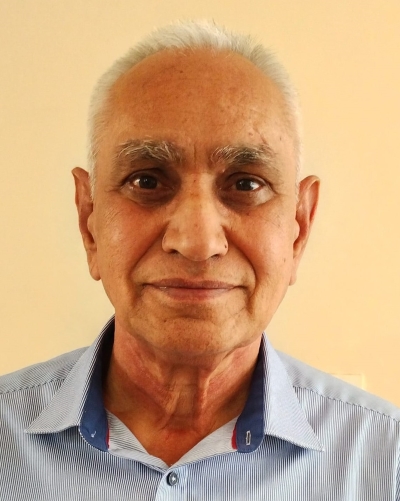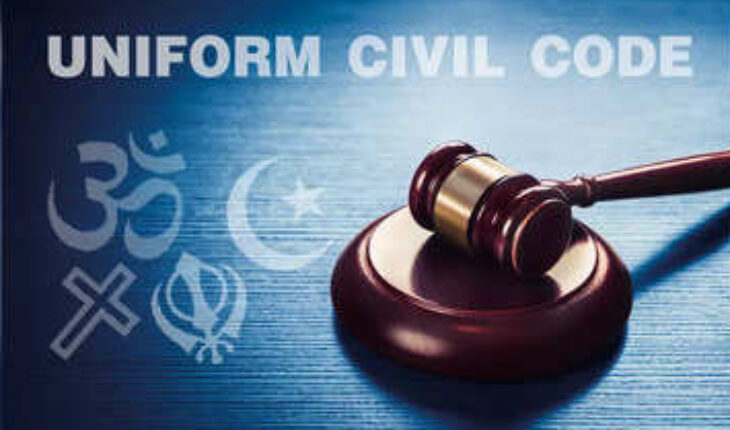
The Haryana and Manipur communal violence has, for the time being, capped the ‘Zinn of UCC’ in the bottle, but it will come out again at its appropriate time. However, these communal clashes have shown that the ‘Zinn’ of UCC may also create a dangerous cloud of abhorrence and people fear that it will thus un-necessarily cause disturbance and unrest in the country.
Indian society is a colourful rainbow of different cultures, customs, ideas and no Uniform Civil Society in India, then how can it be just and possible to implement Uniform Civil Code? The Bharatiya Janata Party government is determined to implement its previously declared and unannounced objectives. In the mid-eighties, the BJP, during the peak era of L K Advani, focused on three main issues – the UCC, abrogation of article 370 and a Ram Mandir in Ayodhya. After the removal of Article 370 and commencing work on Ram Mandir, BJP has started feeling that it is capable of making and implementing any law due to the majority in the Parliament. But until the uniform civil society does not come on the ground, it would be meaningless to bring a uniform civil code law. Has society ever been bound by the rope of law alone? If this were the case then why are child marriages still happening? Why the Dalit class is being treated as second grade class? Why are rapes happening every day? Why the country’s pride women players had to protest and stage sit- ins even to file a case of sexual harassment to get justice against a Bahubali MP? Had the accused been an ordinary person and not a Bahubali Member of Parliament, would the police have given the same laxity in arresting him and filing a case? Why have not the same norms been adopted?
Will all the problems be solved after the implementation of the Uniform Civil Code Act which the present BJP government is trying to force?
What the UCC is ?
On a wider scale, Uniform Civil Code means one law for the whole country. Where the Uniform Civil Code applies, in that country, whatever laws are made related to marriage, divorce, child adoption, property division and all other subjects, they have to be considered equally for the citizens of all religions and castes. At present, many laws in India are decided on the basis of religion and ethnicity too.
It is being claimed that the condition of women in India will improve with the implementation of the Uniform Civil Code. There will be simplicity and clarity in the laws. Discrimination on the basis of laws related to personal or religion will be abolished. But can this really happen?
Expressing doubts over the new UCC, Shiromani Akali Dal president, Sukhbir Singh Badal, pleads that the issue had already been examined in depth by the 21st Law Commission which had in its report in 2018 noted that UCC was neither necessary nor desirable at this stage. It said the Commission also observed that reforms in family laws of different communities would provide better guarantee of securing rights of women and children than bringing in Uniform Civil Laws. It also detailed how the Commission emphasized that cultural diversity must not be compromised and that nothing should be done to pose even a remote threat to the idea of ‘unity in diversity’ and eventually pose threat to the country’s territorial integrity. It said in this light there was nothing significant after 2018 to compel the union government to seek views of stakeholders afresh.
Why the Minorities are afraid of the UCC ?
Differing the new UCC, Shiromani Akali Dal (SAD) clearly rejects the proposed UCC and states that it is not in nation’s interest. Opposing the essence of UCC, the Shiromani Akali Dal (SAD) in a recent letter informed the 22nd Law Commission that the proposed Uniform Civil Code (UCC) was not in the nation’s interest and enforcing it without a genuine countrywide inter-faith consensus, especially among minorities, would violate the spirit of the Constitution and generate fear, distrust and divisive sentiments.
The SAD president also informed the Commission that the party had held consultations with different stake-holders in the State and outside. “On the basis of that, the widespread impression we gathered is that the UCC, if implemented, will definitely affect the freedom of minority communities of different caste, creed and religions”.
Sukhbir Singh Badal also asserted that the framers of the Constitution kept the Uniform Civil Code in the Concurrent List. He said after a detailed discussion on UCC it was decided not to put it in the list of Fundamental Rights but in the Directive Principles of State Policy.
The SAD also stressed that the proposed UCC would also affect Social Tribes who have their own diverse customs, culture and different personal laws. “It will thus un-necessarily cause disturbance and unrest in the country, especially in North Eastern states which enjoy special exemptions from certain laws under article 371 of the Constitution”, Badal added.
Will BJP dare to end the privilege of Hindus ?
Addressing BJP booth workers in Madhya Pradesh, on June 27, Prime Minister Narender Modi said that Muslims were being misled in the name of UCC. “These days, people are being provoked by the UCC. You tell me, if there is one law for one person in a home, and another law for another person, can that house function?” he asked.
But under the HUF, giving a special privilege to Hindus, are there not two discriminatory laws existing for different religions in India?
Will the UCC being implemented by the BJP government dare to end the special exemption in income tax currently given to Hindus (Jains, Buddhists and Sikhs) under Hindu Undivided Family (HUF), which is not available to other religions (Muslims, Christians, Parsis)? Or will the people of other religions also get the benefit of its exemption? Probably not. The BJP government, which is looking forward to win the 2024 elections only on the Hindu vote bank, will never want its Hindu vote bank to be angry, nor will it allow its religion-based purpose to go astray by giving this exemption to other religions at present.
In his article in Indian Express on July 18, 2023– ‘HUF and Uniform Civil Code’, Deepak Joshi a CA writes, “Hindu Undivided Family is a legal entity that allows Hindu (includes Jains, Buddhists and Sikhs) taxpayers to claim certain benefits, but this benefit of statutory tax planning is not available to a tax payer of other religions, such as Muslims, Christians and Parsis etc., which raises concerns over the lack of uniform application of tax laws. Dehors the issue of UCC, it can be argued that granting an additional treatment that lowers the tax burden only on the basis of religion is arbitrary, and may fall out of Article 14 and Article 15 of the constitution.”
Will UCC be able to protect gotra restrictions in marriage ?
According to the present law, any two adults -boy and girl – can marry each other and live together, but in many castes, there are gotra/clan restrictions for marriage, they cannot marry in their own gotra. If the matrimonial system of Jats is seen, then we find that at present three clans and some areas are forbidden in the community. The boy and the girl should not be residents of the same village or fraternal village, both should not be of same clan, marriage is also prohibited in their mother’s and grandmother’s gotra. But the present law gives recognition to such marriages, due to which tension arises in the society. And the social fabric gets frayed and there comes a rift in social harmony and brotherhood. Whenever a young man or woman marries in a forbidden gotra or area, it is considered a question of honour in such families in the society and in most of the cases, incidents of ‘honour killing’ come to the fore. Although the law serves to protect such a married couple, which is considered to be a violation of social norms, and the society grows angry against not only the married couple but also against the government and the law. The government should study such ‘honour killing’ cases and make this law socially compatible.
Social Khap Panchayats have also been demanding from time to time the government to enact a law to stop marriages in prohibited gotras/ areas. Since long, the khap panchayats have been seeking an amendment in the Hindu Marriage Act to prohibit same gotra marriages.
Supporting the concern of Khap Panchayats, on January 10, 2020, Haryana Chief Minister Manohar Lal Khattar had asserted that it has been proven scientifically that intra-clan marriages should not be performed.
“The khap panchayats have a principle that within a village or intra-clan, marriages should not take place. It has been proven scientifically that intra-clan marriages should not be performed,” Khattar said in Panchkula.
Giving example of Gujarat, Khattar stated, “If the relation of sister and brother is followed within the village, or within neighbouring villages and khaps, then certainly it will have a positive impact on the society. I have noticed this in Gujarat also where the women are referred to as Behen (sister) and the men are referred to Bhai (brother).”
Will the Chief Minister’s words be heeded? Will consanguineous and same-village marriages be legally prohibited as demanded by Khap Panchayats? Will UCC be able to solve this discrepancy? Questions need answers.
Discrepancies in Reservation: Will UCC Resolve ?
Reservation in India is purely based on religion and caste, and that too on discriminatory grounds, will UCC be able to resolve these discrepancies?
Alleging “appeasement politics” in granting OBC status to communities in West Bengal, National Commission for Backward Classes (NCBC) chairperson Hansraj Gangaram Ahir himself, on June 8, 2023, stated the state government should fix the “discrepancy” at the earliest.
The NCBC chief also charged that OBC reservations were not being implemented correctly in Rajasthan, Punjab and Bihar — states with non-BJP governments, whereas there are seven districts in Rajasthan which do not extend any reservation to the OBCs and the Punjab, which has 25 per cent reservation for the OBCs, was just granting 12 per cent to the community.
“In Bihar too, there were issues related to Kurmi community which still are to be resolved,” the NCBC chief said.
The question arises here that BJP has a majority government at the centre, why don’t they talk about creating an equal civil society by removing the anomalies of OBC reservation before bringing the Uniform Civil Code?
In Rajasthan, except two districts of Bharatpur and Dholpur, Jats of the rest of the state are considered in the OBC category. Here the question arises that what extra social and educational achievements did the Jats of these two districts have that they were not considered under the backward category? Is it only because these districts had Jat princely states?
Do all the subjects of that caste or society automatically come in the upper class from the social and educational point of view when a particular person or family becomes the head of the state.
If so, Raja Rao Tula Ram had princely state in Rewari and adjoining Ahirwal area in Haryana, his heir Rao Birendra Singh was the chief minister of Haryana and at present his descendant Rao Inderjit Singh is a minister in the centre, then why the Yadav subjects of this Yadav dynasty have been included in the OBC category? Jats and Yadavs in Haryana are almost in the same social, economic and educational category. Both are agricultural castes and both have been living on agriculture and animal husbandry. Both have been sending their youth to the army to be martyred in the interest of the country. Then why are the Jats of Haryana being denied the OBC category? Even the ancestors of Jats were not the owners of any princely state in Haryana.
Are these discrepancies in reservation not the obstructive anomalies hindering the formation of an equal civil society? Will UCC find a solution for them?
Though any majoritarian democratic government has the power to legislate a law to act as a watchdog for the Country’s and Society’s security, safety and welfare, but should always keep in consideration – “Before we pet a watchdog, test and ensure its breed, creed, seed, deed, and need.”
Otherwise, the watchdog may turn out a Pit Bull, which not only bites passers-bye, but may also maul the owner, the past instances have proved so.
Jag Mohan Thaken is a Haryana based retired Senior Bank Manager, views are personal






